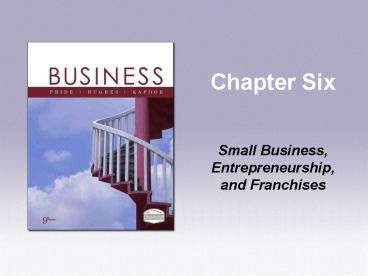Chapter Six PowerPoint PPT Presentation
1 / 17
Title: Chapter Six
1
Chapter Six
- Small Business, Entrepreneurship, and Franchises
2
Small Business Defined
- A business that is independently owned and
operated for profit not dominant in its field - Accounts for 99.7 of all U.S. businesses
- SBA smallness guidelines
- Manufacturinga maximum of 500 employees
- Wholesalinga maximum of 100 employees
- Retailingmaximum annual sales of 6.5 million
- Agriculturemaximum annual sales of .75 million
3
The Small-Business Sector
- There are 23 million businesses in the U.S.
- Only 17,000 employ over 500 workers
- In the last decade, of small businesses
increased by 49 - Part-time entrepreneurs have increase fivefold
and account for one-third of all small businesses - Small businesses provide over 50 of the jobs in
the U.S. - Over 70 of new business fail within their first
5 years
WHY???
4
Why Small Businesses Fail
- Lack of capital
- Cash-flow problems
- Lack of management skills
- Overexpansion
5
Developing a Business Plan
- A carefully constructed guide for the person
starting a business - -Accuracy and realistic expectations are crucial
- Need to include
- Description of the goods or services to be
offered - Detailed estimate of potential customers
- Current competitors
- Facilities and labor force needed
- Financing and cash flow required
- Marketing strategy
- Exit Strategy-go public, sell out, dissolve
6
The Small Business Administration
- A governmental agency that assists, counsels,
and protects the interests of small business in
the U.S - Types of SBA management assistance
- Management courses and workshops
- Service Core of Retired Executives (SCORE)
- SBA publications
7
Importance of Small Business to Economy
- 1) Providing employment
- hire a larger proportion of younger workers,
older workers, women, and part-time workers - provide 67 of workers with their first job and
initial job skills - provide 2/3 of the new jobs added to the economy
8
Importance of Small Business
- 2) Providing technological innovation
- Innovation among small-business workers is higher
than among workers in big business - More than half of the major technological
advances of the 20th century originated with
individual inventors and small businesses
9
Importance of Small Business to Economy
- 3) Providing competition
- Satisfy niche markets, forcing larger firms to
become more responsive to customer needs - 4) Filling needs of society other businesses
- meet the special needs of smaller customers
- act as specialized suppliers of goods and
services to larger businesses
10
The Pro and Cons of Smallness
- ADVANTAGES
- Personal relationships with customers and
employees - Ability to adapt to change
- Independence
- Keeping all profits
- Ease and low cost of going into business
- Keeping business information secret
- DISADVANTAGES
- Risk of failure
- Limited potential
- Limited ability to raise capital
11
Franchising
- Franchise
- A license to operate an individually owned
business as though it were part of a chain of
outlets or stores - Franchisor
- An individual or organization granting the
franchise (Avon Corp) - Franchisee
- A person or organization purchasing a franchise
(Avon lady in your neighborhood)
12
Types of Franchises
- Product and trade name-
- Dealer sells product provided by the
franchisor, but can use any sales tactics he
chooses ex-Michelin Tires
- Business Format-
- Dealer must sell the product in the exact way
the franchisor prescribes ex-Mc Donalds
13
Entrepreneurs Top Ten Franchises in 2006
- Subway
- Quiznos Sub
- Curves
- UPS Store, The
- Jackson Hewitt Tax Service
- Dunkin' Donuts
- Jani-King
- RE/MAX Int'l. Inc.
- 7-Eleven Inc.
- Liberty Tax Service
- For updates www.franchise500.com
14
Advantages of Franchising
- TO THE FRANCHISOR
- Fast and well controlled distribution of its
products - No need to construct and operate its own outlets
- More working capital available for expanded
production and advertising - Franchising agreements maintain product and
quality standards - Motivated work force of franchisees because they
see themselves as owners
15
Advantages of Franchising
- TO THE FRANCHISEE
- Opportunity to start a proven business with
limited capital - Guaranteed customers
- Franchisor available for advice and guidance
- Materials for local promotional campaigns and
participation in national campaigns - Cost savings when purchasing supplies in
cooperation with other franchisees
16
Disadvantages of Franchising
- TO THE FRANCHISOR
- Failure of the franchisee to operate franchise as
agreed - Disputes with franchisees over the terms of the
franchise (flat or royalty, sphere of influence)
17
Disadvantages of Franchising
- TO THE FRANCHISEE
- Franchisor retains a large amount of control over
the franchisees activities - Franchisor or other franchisees opening competing
outlets within the franchisees market

